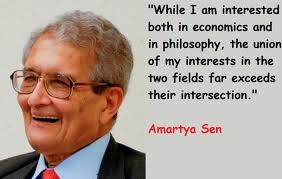

To reduce such a richly diverse book to a couple of main themes is a disservice, for there is much here to reward the careful reader (notably two startlingly educative essays on the ancient roots of relations between India and China). The Nobel citation lauded him for restoring "an ethical dimension to the discussion of vital economic problems," and a strong moral sense is never absent from his prose. The essays are also informed by Sen's passionate concern for the impoverished, undernourished and marginalized, especially women.

There is none of the economist's propensity to theorize on the basis of airy assumptions here Sen's arguments are grounded in a keenly felt, deeply empathetic reading of Indian history and culture, augmented by a breadth and depth of research (extensively footnoted) that is breathtaking in its range and scholarly eclecticism. Sen convincingly demonstrates that Asian (and specifically Indian) traditions of rationality and scientific liberalism go further back than Western ones and have been just as important as the religious or mystical strains in shaping India's heritage. Emendation he provides, in capacious detail. "There is certainly a need for some emendation here," Sen adds dryly. He is particularly critical of the Western overemphasis on India's religiosity at the expense of any recognition of the country's equally impressive rationalist, scientific, mathematical and secular heritage, fields treated by Orientalists as "Western spheres of success." That is because Sen uses it, along with "exoticist" and "curatorial," to describe the three perspectives from which the West has tended to view India (each of which he dissects and discredits with precision and finesse).


 0 kommentar(er)
0 kommentar(er)
